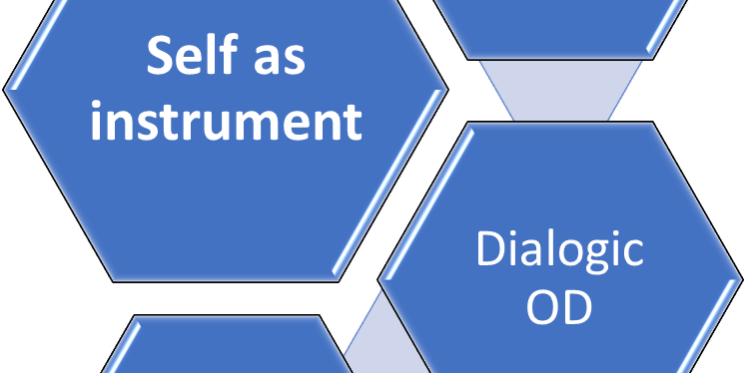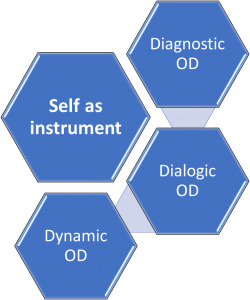Part 1: A mindset, skillset and toolset for change
– Dr Sharon Varney
OD is for you!
Saying that Organisational Development is just for OD specialists is a bit like saying computers are just for IT professionals.
In the past, OD was the preserve of specialists. Yet, with increasing organisational complexity, the job of creating organisational change and effectiveness is simply too big and too complex for one team [1]. As a result, more and more people are being involved in change and transformation work as part of their day job. Managers and professionals with all kinds of job titles are working hard to introduce new, different, and potentially better ways of working.
But, the problem is that few of them know how to go beyond the project plan to make the magical transition between A and B happen for teams and organisations. It’s not their fault. Few have had any training in this area. All too often, therefore, well-intentioned change efforts take an economic and emotional toll, yet fail to deliver the hoped-for benefits.
So, developing an OD mindset, skillset and toolset is fast becoming an essential for all managers and professionals. And smart businesses are leveraging their change-ability by developing OD capabilities across their organisation; helping them to achieve sustained success in a changing world.
A strong heritage and a rich knowledge base
OD has a strong heritage and a rich knowledge base. It roots can be traced back to the late 1940s with the group dynamics work of social scientists at the National Training Laboratories in the US and the parallel group relations work at The Tavistock Insitute in the UK [2].
Taking an OD approach means involving people in creating change that affects them from the outset. Change programmes that seek to save time by not doing this up front often pay the price of an agonisingly long drag to try and get people on board later on. (If you ever see a project plan with ‘implementation’ at the end, you should be worried… very worried!)
If you think that OD is all touchy-feely, think again. Taking an OD approach means working from data. Data may be hard or soft, big or small. The best OD uses multiple sources of data and listens to multiple voices. Taking an OD approach also means applying theory. OD draws from areas such as behavioural science, positive psychology, and complexity science to inform the tools we use. As leading OD expert, Mee-Yan Cheung-Judge [3], frequently puts it; OD is a ‘magpie’ discipline. Practitioners continue learning and building a knowledge base that they can call on to help build and sustain effective organisations in a changing world.
Despite its long history, OD has seen something of a renaissance in the UK over the past 15 years [2]. Under constant pressure to adapt and reinvent themselves, more and more organisations are creating and developing specialist OD teams. The smart ones are also developing a network of OD-savvy people across their organisations. This helps them to power up their OD work through partnership working, to adapt and flex to changing conditions, and to extend the reach of their OD work.
An evolving field of knowledgeable OD practice
OD thinking and practice has evolved over the past 70 years.
OD has embraced diagnostic, dialogic and dynamic approaches to OD – more about those in Part 2! – to ensure it remains relevant and important in a VUCA world [4].
Yet the importance of the mindset and skillset of the OD practitioner – the use of ‘self’ as the primary instrument[5] for OD – remains a core foundation in OD practice and makes it distinct from similar areas, such as change management and business improvement. We will explore that further in Part 3.
It is this evolution of OD practice, and the commitment of OD practitioners – whatever their job title – to ongoing development, that has kept this field so vibrant. And it’s why I love working in this area, both as an OD practitioner, and someone who develops OD professionals.
To close… for now
In this paper, I have considered why more and more managers, professionals and specialists need to develop a mindset, skillset and toolset for OD.
I have briefly introduced a framework for advancing OD practice that comprises four inter-related elements:
– Self as an instrument
– Diagnostic OD
– Dialogic OD
– Dynamic OD.
This framework underpins The Henley Forum’s Advancing your OD Practice programme [6] that I introduced at Henley Business School. My valued co-tutor, John Hovell, and I use this framework to help participants better understand what strengths they bring to this field, and to prompt them to take a step or two in advancing their OD Practice.
In our next articles, John and I will walk you through this framework in more detail:
– Part 1: A mindset, skillset and toolset for change
– Part 2: A framework for advancing your OD practice
– Part 3: Self as an instrument for OD.
Download article: Advancing your OD practice Pt1
Stay in touch
If you’d like to discuss applying this within your organisation, or to receive copies of the other articles in the series, please drop me a line: sharon.varney@spaceforlearning.com | +44 (0)7946 581875
Dr Sharon Varney and John Hovell lead The Henley Forum’s Advancing your OD Practice programme.
The programme is unique (we believe) in bringing together people from different fields. Some have considerable OD experience and are looking to extend their practice. Others bring valuable expertise and life experience from other domains, and are taking their first steps in the OD world. That diversity creates a rich learning experience.
The next programme takes place 22-23 January 2019 at Henley Business School.
Book by 30 November for our best price.
More information at: https://www.henley.ac.uk/events/advancing-your-od-practice
Reserve your place by emailing henleyforum@henley.ac.uk
[1] See the Henley Forum research on partnering for change. You can download free summaries at: https://www.henley.ac.uk/research/research-centres/the-henley-forum-for-organisational-learning-and-knowledge-strategies/folks-knowledge-in-action Find out more about the Henley Forum at: www.henley.ac.uk/henleyforum
[2] You can see more about the history of OD in: ‘Fish or Bird? Perspectives on Organisational Development (OD)’ by Garrow, Varney & Lloyd. You can download the report for free at: https://www.employment-studies.co.uk/resource/fish-or-bird-perspectives-organisational-development-od
[3] Mee-Yan Cheung-Judge is a leading OD practitioner and speaker. Along with Linda Holbeche, she is author of one of the best OD books around: ‘Organization Development: A practitioner’s guide for OD and HR’ (2015), Kogan Page
[4] A world that is more Volatile, Uncertain, Complex and Ambiguous









1 Comment